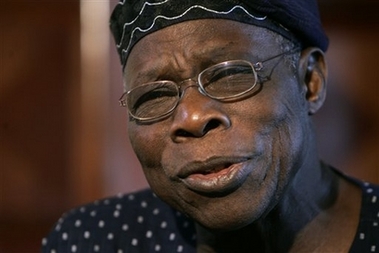


Posted by By DONNA BRYSON, Associated Press Writer on



Saying two terms is enough, Nigeria's president said Saturday that trying to uproot the corruption entangling Africa's biggest oil-exporting nation and making strides to transform the economy were the main challenges during his seven years in power.
LONDON - Saying two terms is enough, Nigeria's president said Saturday that trying to uproot the corruption entangling Africa's biggest oil-exporting nation and making strides to transform the economy were the main challenges during his seven years in power.
In a wide-ranging interview in London, President Olusegun Obasanjo also spoke of efforts to calm Nigeria's south, where militants are battling the government for control of the area's oil wealth. He said he is addressing the need for jobs and cracking down on "criminality" there.
A strong campaign by Obasanjo's supporters to amend the constitution to enable him to run for a third term was defeated in parliament last month. Backers argued he needed more time to complete reforms, but opponents said an extension would undermine democracy on a continent where many leaders have entrenched themselves as dictators for life.
During the debate, Obasanjo never discussed whether he wanted to run again, but said Saturday: "When I took this job, I took it on the basis of the constitution."
Nigeria was ruled by military dictators, many of them corrupt, for 29 of the 45 years after its independence from Britain. Obasanjo himself once ruled as a military dictator, but returned to power through the ballot box in 1999. He completes his second term next year.
He has been credited with guiding the economy of Africa's most populous nation to a growth rate projected at more than 8 percent this year, and with bringing down unemployment and the percentage of Nigerians living in poverty.
In April, Nigeria became the first country in Africa to pay off its debts to the Paris Club, an informal group of creditor nations, freeing up cash for investing at home. Nigeria worked off $30 billion in Paris Club debts through cancellation grants and buybacks.
Obasanjo said he was surprised when he first took office by how pervasive corruption is in his homeland, affecting all aspects of life.
"It took me some time to be able to come to grips with the depth of the decay," he said.
The anti-corruption group Transparency International rated Nigeria the most corrupt country in the world in 2000, a year after Obasanjo became president. The rating has improved but was still at the bottom of the scale in 2005, the group's most recent survey.
But Obasanjo said he has been able to make inroads and the result has been improvements in the economy and other areas affecting the 130 million Nigerians.
Obasanjo, who was in London for talks with potential investors, said the international community is starting to see Nigeria as a responsible business partner.
Instability in the oil-producing southern Niger Delta, however, is a serious concern, both for Nigeria and for the foreign giants like Royal Dutch Shell PLC and Exxon Mobil Corp. that have operations there.
Militants have attacked oil facilities and kidnapped oil workers in unrest that Obasanjo blamed on "many years of accumulation of neglect" by oil companies and government officials.
"But now we are ready to confront the problem head on. Firstly, we must win the hearts and minds of the people," he said.
But Obasanjo, who has launched a security crackdown in the region, added that "we must not encourage criminality."
He said that while he understood the anguish of relatives of people kidnapped by the militants, he did not encourage paying ransom as oil companies reportedly have done.
Looking ahead to life after the presidency, Obasanjo said he wanted to devote himself to farming and to various development projects in Nigeria.
He also said he would be willing to continue being a regional peacemaker. Obasanjo has led efforts to calm conflicts in Sudan's Darfur region, Ivory Coast, Togo and Liberia.
On Darfur, the most critical area now, he said it should be possible to persuade Sudan's leaders to drop their opposition to U.N. peacekeepers taking over from an inadequate African Union force. He pointed to Sierra Leone and Liberia, where U.N. forces "embraced" existing African peacekeeping missions.
On Liberia, Obasanjo said he did not believe Nigeria's standing as a regional peacemaker had been undermined when former Liberian President Charles Taylor's exile in Nigeria was ended and he was handed over for trial before an international war crimes tribunal.
Nigeria had been credited with helping end Liberia's civil war by taking in Taylor. Some of Taylor's associates have said other African leaders would be reluctant to step down if they feared one day being prosecuted.
Obasanjo said Taylor was offered only a temporary haven in Nigeria, and was turned over after his democratically elected successor in Liberia, Ellen Johnson Sirleaf, requested it after she took office in January.
Britain announced Thursday it would jail Taylor if he were convicted, breaking an impasse that had stalled his trial. Obasanjo said he hoped Britain's offer would not be limited to African leaders, saying that "Africa does not have a monopoly on criminals."

